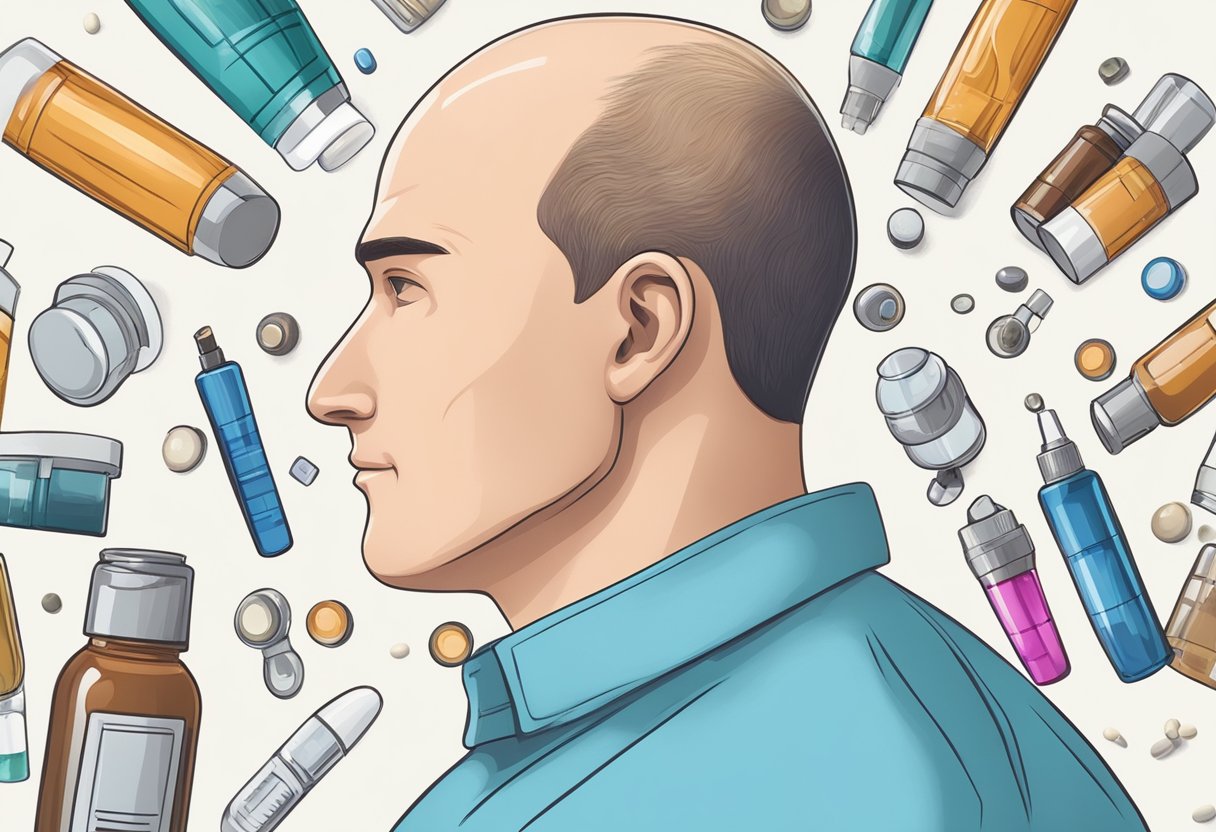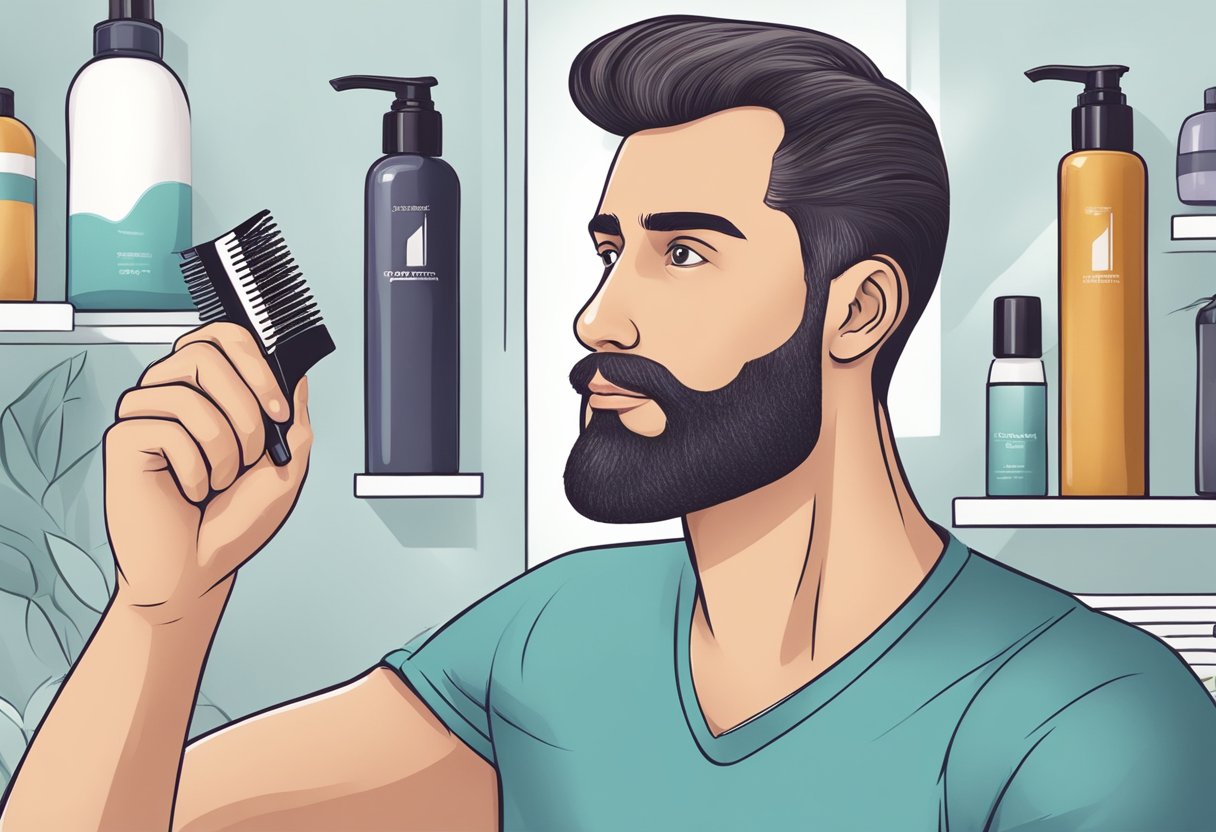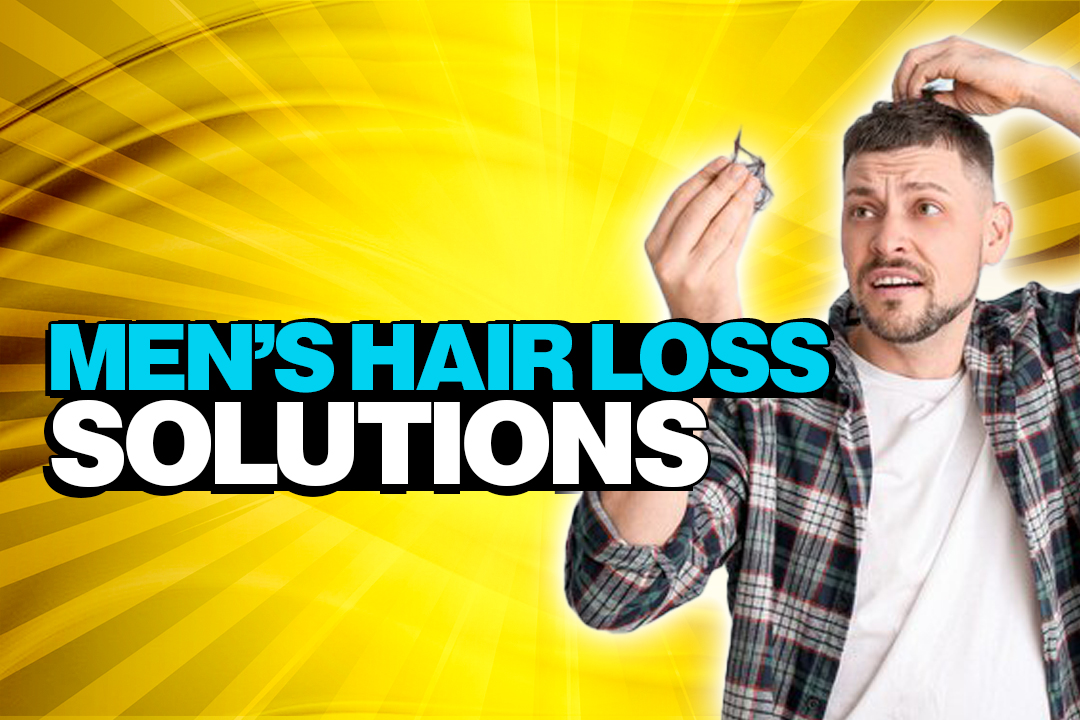As a 40-year-old American man, I understand the frustration and embarrassment that comes with hair loss. No, I am not going bald, but yes I have experienced how hair loss feels like at this age. Thinning hair can happen to anyone, but it’s more common in men. Fortunately, there are solutions to combat hair loss and promote hair growth. I have written this so that I can share with you some Men’s Hair Loss Solutions.
Please note, none of what I am going to share with you should not be considered medical advice of as a prescription/recommendation. I am sharing and account of what I have researched from my friends and on the internet.

Identifying the cause of hair loss is the first step in finding a solution. Genetics, stress, and health conditions can all contribute to hair loss. Once you know the cause, you can take steps to prevent further hair loss and promote hair growth.
There are many tips and remedies to prevent hair loss, from scalp massages to using the right shampoo. Natural remedies and supplements, such as biotin and saw palmetto, can also help promote hair growth. Lifestyle changes, such as eating a healthy diet and reducing stress, can also make a big difference. In more advanced cases, hair restoration techniques such as hair transplants and scalp micro-pigmentation can be effective.
Key Takeaways
- Identifying the cause of hair loss is crucial to finding a solution.
- Tips and remedies such as scalp massages and natural supplements can help prevent hair loss and promote hair growth.
- In advanced cases, hair restoration techniques such as hair transplants can be effective.
Identifying the Cause of Hair Loss
Before seeking out solutions, it’s important to identify the cause of hair loss. There are several factors that can contribute to hair loss, including genetic factors, hormonal changes, medical conditions, and lifestyle influences.
1. Genetic Factors
Male pattern baldness, also known as androgenetic alopecia, is the most common cause of hair loss in men. This condition is inherited and can begin as early as the teenage years. It typically starts with a receding hairline and thinning at the crown of the head.
2. Hormonal Changes
Hormonal changes can also contribute to hair loss. Testosterone is converted into dihydrotestosterone (DHT) in the body, which can cause hair follicles to shrink and eventually stop producing hair. This process is known as miniaturization and is the cause of hair loss in many men.
3. Medical Conditions
Certain medical conditions can also lead to hair loss. These include thyroid disorders, autoimmune diseases, and scalp infections. If you are experiencing sudden or excessive hair loss, it’s important to consult with a healthcare professional to rule out any underlying medical conditions.
4. Lifestyle Influences
Finally, lifestyle influences can also play a role in hair loss. Poor nutrition, stress, and smoking can all contribute to hair loss. It’s important to maintain a healthy diet and manage stress levels to promote overall health and reduce the risk of hair loss.
Identifying the cause of hair loss is an important first step in finding a solution. By understanding the underlying factors contributing to hair loss, you can take steps to address these issues and promote healthy hair growth.
Tips and Remedies to Prevent Hair Loss
Maintaining a head with full hair always feels good. Thinning hair can be a frustrating and embarrassing issue to deal with. However, there are several tips and remedies that can help prevent hair loss and promote healthy hair growth.
Proper Hair Care
Proper hair care is essential to prevent hair loss. It’s important to avoid harsh chemicals and excessive heat styling, as these can damage hair follicles and lead to hair loss. Instead, opt for gentle, sulfate-free shampoos and conditioners that are designed to promote hair growth. Regularly massaging your scalp can also help stimulate hair growth by increasing blood flow to the hair follicles.
Nutritious Diet
A nutritious diet is essential for healthy hair growth. Foods rich in vitamins and minerals such as iron, zinc, and biotin can help prevent hair loss and promote healthy hair growth. Some examples of hair-healthy foods include salmon, eggs, spinach, and sweet potatoes. Additionally, staying hydrated by drinking plenty of water can help keep hair healthy and strong.
Hair Loss Products
There are several over-the-counter hair loss products that can help prevent hair loss and promote healthy hair growth. Some examples include minoxidil and finasteride. These products work by blocking the production of DHT, a hormone that can contribute to hair loss. It’s important to note that these products may not work for everyone and can have potential side effects, so it’s important to talk to a doctor before using them.
Hair Transplant Surgery
For more severe cases of hair loss, hair transplant surgery may be an option. During this procedure, hair follicles are taken from a donor area and transplanted to the balding area. This can help restore a full head of hair and improve self-confidence. However, it’s important to note that hair transplant surgery can be expensive and may not be covered by insurance.
In conclusion, there are several tips and remedies that can help prevent hair loss and promote healthy hair growth. By taking proper care of your hair, maintaining a nutritious diet, using hair loss products, and considering hair transplant surgery if necessary, you can help maintain a full head of hair and improve your self-confidence.
Natural Remedies and Supplements
While there are many treatments available, natural remedies and supplements can be a great option for those who prefer a more holistic approach.
Herbal Treatments
Herbal treatments have been used for centuries to promote hair growth and combat hair loss. Saw palmetto is a popular herb that has been shown to block the production of DHT, a hormone that contributes to hair loss. Nettle root is another herb that can be effective in preventing hair loss by blocking DHT.
Essential Oils
Essential oils are another natural remedy that can be used to promote hair growth and combat hair loss. Rosemary oil has been shown to stimulate hair growth and improve circulation in the scalp. Peppermint oil can also be effective in promoting hair growth by increasing blood flow to the scalp.
Vitamin and Mineral Supplements
Vitamins and minerals are essential for healthy hair growth. Biotin, also known as vitamin H, is a B-complex vitamin that is important for healthy hair, skin, and nails. Zinc is another important mineral that can help prevent hair loss by regulating hormone levels and improving scalp health.
Natural remedies and supplements can be a great option for those looking to combat thinning hair. However, it’s important to remember that not all natural remedies are created equal and some may not work for everyone. It’s always a good idea to consult with a healthcare professional before starting any new supplement or treatment.
Related Posts:
Lifestyle Changes for Hair Preservation

I have researched and discovered various lifestyle changes that can help preserve hair and combat thinning hair. These lifestyle changes include dietary adjustments, stress management techniques, and exercise.
Dietary Adjustments
Diet plays a crucial role in hair health. Consuming a balanced diet that includes protein, iron, and vitamins can help prevent hair loss. Foods rich in protein such as lean meat, fish, and beans can help strengthen hair follicles. Iron-rich foods such as spinach, lentils, and red meat can help improve blood circulation to the scalp, promoting hair growth. Vitamins such as biotin, vitamin C, and vitamin D are also essential for hair health. Foods rich in these vitamins include eggs, citrus fruits, and fatty fish.
Stress Management Techniques
Stress is a major contributor to hair loss. Stress can cause hormonal imbalances that can lead to hair loss. Therefore, managing stress is essential for hair preservation. Techniques such as meditation, deep breathing, and yoga can help reduce stress levels. Engaging in hobbies and spending time with loved ones can also help reduce stress levels.
Exercise and Hair Health
Exercise is not only beneficial for physical health but also for hair health. Exercise can improve blood circulation to the scalp, promoting hair growth. Engaging in activities such as running, cycling, and swimming can help improve blood circulation to the scalp. However, excessive exercise can also lead to hair loss. Therefore, it is essential to engage in moderate exercise.
In conclusion, making lifestyle changes such as dietary adjustments, stress management techniques, and exercise can help preserve hair and combat thinning hair. By incorporating these lifestyle changes into my daily routine, I have noticed an improvement in my hair health.
Advanced Hair Restoration Techniques
Luckily, there are advanced hair restoration techniques available that can help combat hair loss. In this section, I will discuss three popular techniques: Platelet-Rich Plasma Therapy, Stem Cell Therapy, and Microneedling for Scalp.
Platelet-Rich Plasma Therapy
Platelet-Rich Plasma (PRP) Therapy is a non-surgical hair restoration technique that uses the patient’s own blood to stimulate hair growth. The process involves drawing blood from the patient’s arm and then processing it in a centrifuge to separate the platelets from the rest of the blood. The resulting platelet-rich plasma is then injected into the patient’s scalp.
PRP therapy is believed to work by promoting hair growth through the release of growth factors and other proteins. This technique is relatively safe and has shown promising results in clinical studies. However, it may take several sessions to see significant results.
Stem Cell Therapy
Stem Cell Therapy is a hair restoration technique that involves using stem cells to stimulate hair growth. The process involves extracting stem cells from the patient’s own body, usually from the fat tissue, and then injecting them into the scalp.
Stem cells are believed to work by promoting hair growth through the release of growth factors and other proteins. This technique is still relatively new, and more research is needed to determine its effectiveness.
Microneedling for Scalp
Microneedling for Scalp is a hair restoration technique that involves using a small device with tiny needles to create micro-injuries on the scalp. The process is believed to stimulate the production of collagen and elastin, which can help promote hair growth.
Microneedling for Scalp is a safe and minimally invasive technique that has shown promising results in clinical studies. However, it may take several sessions to see significant results.
In conclusion, there are several advanced hair restoration techniques available that can help combat thinning hair. However, it is important to consult with a qualified professional to determine which technique is best for your individual needs.
Frequently Asked Questions about Men’s Hair Loss Solutions
I have researched about men’s hair loss solutions extensively and all the questions that I and my friends had, I thought it is best to compile it in the form of FAQs, so here we are.
What natural remedies can men use to regrow thinning hair?
I have tried several natural remedies to regrow thinning hair. Some of the most effective ones include massaging the scalp with essential oils such as peppermint, rosemary, and lavender. These oils help to increase blood circulation to the scalp, which in turn promotes hair growth. Another natural remedy is using aloe vera gel, which contains enzymes that can help to unclog hair follicles and stimulate hair growth.
What are the most effective treatments for male hair loss?
There are several effective treatments for male hair loss. One of the most popular ones is minoxidil, which is a topical solution that is applied directly to the scalp. It helps to increase blood flow to the hair follicles and stimulate hair growth. Another effective treatment is finasteride, which is a medication that helps to block the hormone responsible for hair loss. Hair transplant surgery is also an option for men who have significant hair loss.
How can men stop hair fall immediately and effectively?
To stop hair fall immediately and effectively, men can try using a hair thickening shampoo that contains ingredients such as biotin, keratin, and panthenol. These ingredients help to strengthen hair strands and prevent breakage. Another option is using a hair serum that contains caffeine, which helps to stimulate hair growth and prevent hair fall.
Can male hair thinning be reversed, and if so, how?
Male hair thinning can be reversed in some cases. The key is to address the underlying cause of the hair loss. For example, if the hair loss is due to a nutritional deficiency, taking supplements or changing the diet can help to reverse the thinning. If the hair loss is due to a hormonal imbalance, medication or hormone therapy may be necessary. In some cases, hair transplant surgery may be the best option.
What supplements or medications are recommended for men experiencing hair loss?
There are several supplements and medications that are recommended for men experiencing hair loss. Biotin, zinc, and iron are all important nutrients for healthy hair growth. Saw palmetto and pumpkin seed oil are natural supplements that can help to block the hormone responsible for hair loss. Minoxidil and finasteride are medications that are commonly used to treat male hair loss.
How can men reverse male pattern baldness using natural methods?
While male pattern baldness is difficult to reverse completely, there are natural methods that can help to slow down the progression of the condition. One of the most effective methods is massaging the scalp with essential oils such as peppermint, rosemary, and lavender. These oils help to increase blood circulation to the scalp and stimulate hair growth. Another natural method is taking supplements such as saw palmetto and pumpkin seed oil, which can help to block the hormone responsible for hair loss.

